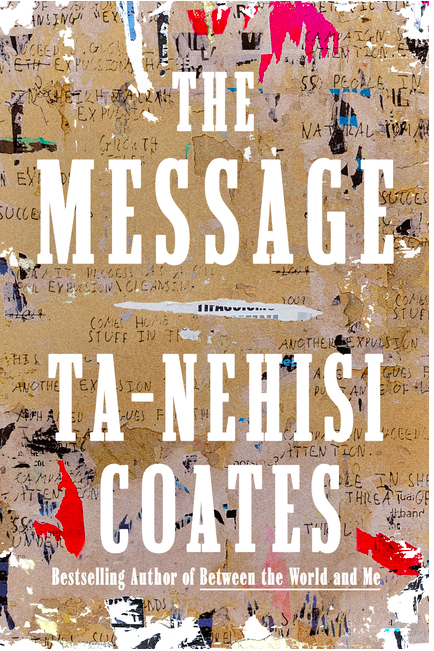 Image 1 of 1
Image 1 of 1


The Message
Coates originally set off to write a book about writing, in the tradition of Orwell's classic Politics and the English Language, but found himself grappling with deeper questions about how our stories -- our reporting and imaginative narratives and mythmaking -- expose and distort our realities. The first of the book's three intertwining essays is set in Dakar, Senegal. Despite being raised as a strict Afrocentrist -- and named for Nubian pharaoh -- Coates had never set foot on the African continent until now. He roams the 'steampunk' city of 'old traditions and new machinery, ' meeting with strangers and dining with local writers who quiz him in French about African American politics.
But everywhere he goes he feels as if he's in two places at once: a modern city in Senegal and a mythic kingdom in his mind, the pan-African homeland he was raised to believe was the origin and destiny for all black people. Finally he travels to the slave castles off the coast and touches the ocean that carried his ancestors away in chains -- and has his own reckoning with the legacy of the Afrocentric dream. Back in the USA he takes readers along with him to Columbia, South Carolina, where he explores a different mythology, this one enforced on its subjects by the state. He enters the world of the teacher whose job is threatened for teaching one of Coates's own books and discovers a community of mostly white supporters who were transformed and even radicalized by the stories they discovered in the 'racial reckoning' of 2020.
But he also explores the backlash to this reckoning and the deeper myths and stories of the community -- a capital of the confederacy with statues of segregationists looming over the its public squares. In Palestine, the longest of the essays, he discovers the devastating gap between the narratives we've accepted and the clashing reality of life on the ground. He meets with activists and dissidents, Israelis and Palestinians -- the old, who remember their dispossessions on two continents, and the young who have only known struggle and disillusionment. He travels into Jerusalem, the heart of Zionist mythology, and to the occupied territories, where he sees the reality the myth is meant to hide. It is this hidden story that draws him in and profoundly changes him -- and makes the war that would soon come all the more devastating"--
Coates originally set off to write a book about writing, in the tradition of Orwell's classic Politics and the English Language, but found himself grappling with deeper questions about how our stories -- our reporting and imaginative narratives and mythmaking -- expose and distort our realities. The first of the book's three intertwining essays is set in Dakar, Senegal. Despite being raised as a strict Afrocentrist -- and named for Nubian pharaoh -- Coates had never set foot on the African continent until now. He roams the 'steampunk' city of 'old traditions and new machinery, ' meeting with strangers and dining with local writers who quiz him in French about African American politics.
But everywhere he goes he feels as if he's in two places at once: a modern city in Senegal and a mythic kingdom in his mind, the pan-African homeland he was raised to believe was the origin and destiny for all black people. Finally he travels to the slave castles off the coast and touches the ocean that carried his ancestors away in chains -- and has his own reckoning with the legacy of the Afrocentric dream. Back in the USA he takes readers along with him to Columbia, South Carolina, where he explores a different mythology, this one enforced on its subjects by the state. He enters the world of the teacher whose job is threatened for teaching one of Coates's own books and discovers a community of mostly white supporters who were transformed and even radicalized by the stories they discovered in the 'racial reckoning' of 2020.
But he also explores the backlash to this reckoning and the deeper myths and stories of the community -- a capital of the confederacy with statues of segregationists looming over the its public squares. In Palestine, the longest of the essays, he discovers the devastating gap between the narratives we've accepted and the clashing reality of life on the ground. He meets with activists and dissidents, Israelis and Palestinians -- the old, who remember their dispossessions on two continents, and the young who have only known struggle and disillusionment. He travels into Jerusalem, the heart of Zionist mythology, and to the occupied territories, where he sees the reality the myth is meant to hide. It is this hidden story that draws him in and profoundly changes him -- and makes the war that would soon come all the more devastating"--
About the Author:
Ta-Nehisi Coates is the author of The Beautiful Struggle, We Were Eight Years in Power, The Water Dancer, and Between the World and Me, which won the National Book Award in 2015. He is the recipient of a National Magazine Award and a MacArthur Fellowship. He is currently the Sterling Brown endowed chair at Howard University in the English department.







